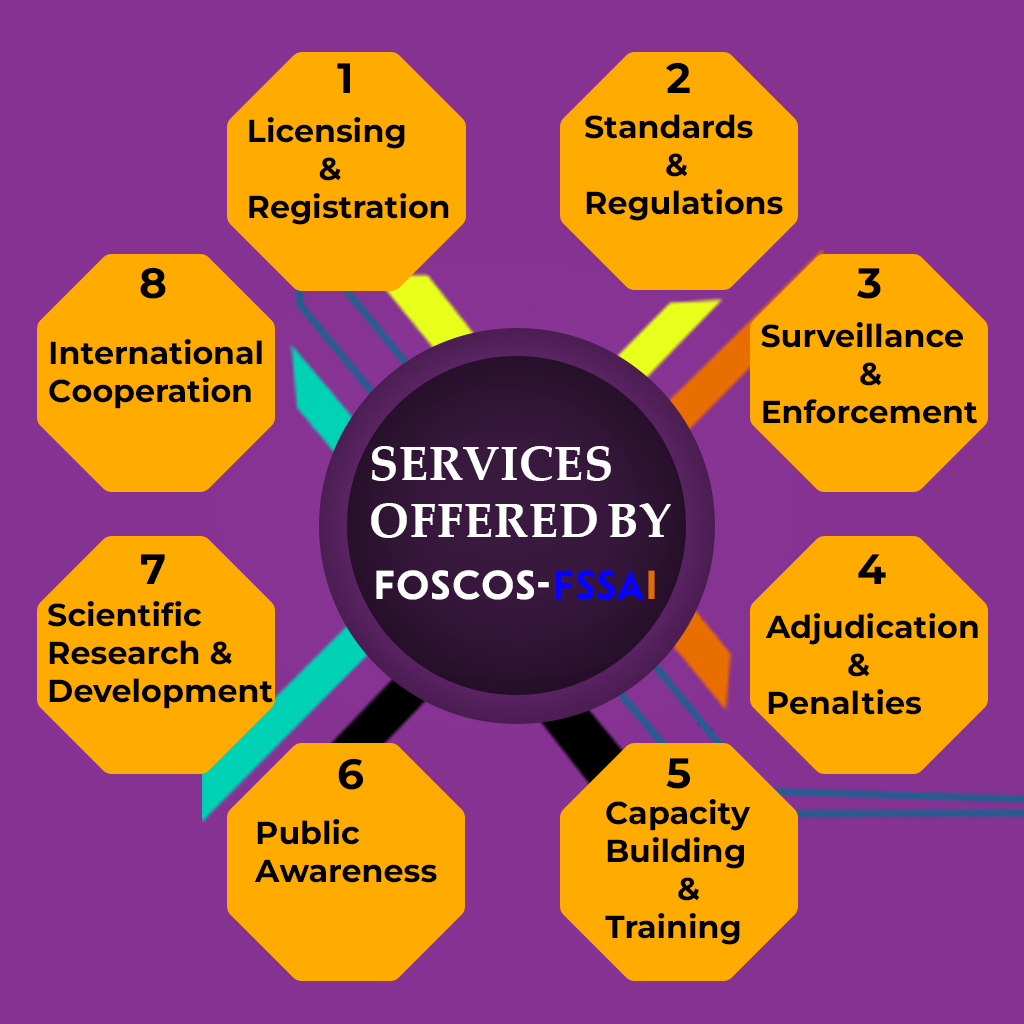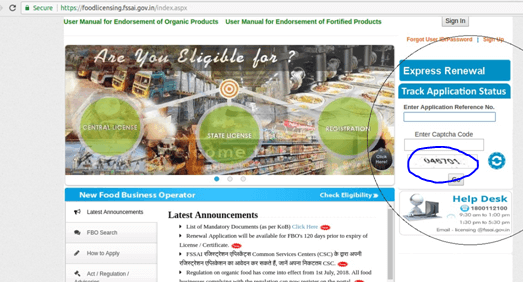Explore the this blog to get information about FSSAI. Learn the process to download your FSSAI Certificate through FoSCoS Login
FoSCoS FSSAI Overview
FoSCoS stands for ‘Food Safety and Standards Authority of India.’ FSSAI is an acronym for the same thing. It is an autonomous organization under the Ministry of Health & Family Welfare, Government of India. FSSAI’s main responsibility is to protect and promote public health through regulating food safety. It sets food safety standards, guidelines, and regulations in India, and enforces them by issuing licenses and registrations to food businesses. It also monitors and inspects food products and takes action against violators. Moreover, FSSAI plays a key role in creating awareness about safe food practices and building the capacity of food business operators and stakeholders in the food sector.
Compliance with FSSAI regulations and obtaining a valid FSSAI registration or food & safety license is crucial for all food business operators, from manufacturers to sellers. The food sector is considered vital for the population and economy, making FSSAI’s mission of ensuring safe and wholesome food essential to maintain and improve the nation’s health.
Objectives for FoSCoS FSSAI
The Food Safety and Standards Authority of India (FoSCoS or FSSAI) has the following main objectives:
- Protect public health: FSSAI’s primary goal is to safeguard and promote public health by overseeing the safety of food products in India.
- Ensure safe and wholesome food: FSSAI is responsible for ensuring that all food products available in India are safe and fit for human consumption. This involves setting food safety and standards guidelines and conducting inspections to ensure compliance.
- Regulate food businesses: FSSAI issues licenses and registrations to food businesses and monitors their adherence to food safety regulations. It conducts inspections of food manufacturing and processing facilities and takes appropriate actions against violators.
- Building capacity of food business operators: FSSAI aims to empower food business operators with the knowledge and skills to comply with regulations and maintain food safety and hygiene standards.
- Facilitate international trade: FSSAI supports international trade by ensuring that food products exported from India meet the food safety and standards regulations of importing countries through various agreements and collaborations.
- Create awareness: FSSAI actively educates consumers, food business operators, and other stakeholders about safe food practices. This includes promoting awareness of food safety, nutrition, and providing training for compliance with regulations.
- Provide scientific and technical support: FSSAI offers valuable scientific and technical support to stakeholders in the food sector, including food business operators, government agencies, and researchers. This support aims to enhance food safety practices and improve the overall quality of food products in India.
Features Of FoSCoS
FoSCoS FSSAI has several key features. It safeguards public health and ensures food safety in India. Some of the main features of FSSAI include:
- Autonomous Organization: FSSAI operates as an autonomous organization established under the Ministry of Health & Family Welfare, Government of India. This autonomy grants it the authority to function independently and make decisions without interference from other government agencies.
- Setting Standards: FSSAI’s core responsibility is to establish food safety and standards guidelines for all food products in India. These guidelines are based on international standards and undergo regular review and updates as necessary.
- Licensing and Registration: FSSAI issues licenses and registrations to food business operators, which are mandatory for all businesses involved in handling, processing, manufacturing, storing, distributing, or selling food products.
- Inspection and Enforcement: FSSAI holds the authority to inspect food manufacturing and processing facilities, investigate complaints, and enforce compliance with food safety regulations.
- Scientific and Technical Support: FSSAI provides scientific and technical support to food business operators, other government agencies, and researchers to enhance the overall quality of food products in India.
- Risk Management: FSSAI also undertakes risk management to ensure that food products in India are safe and wholesome for human consumption. This includes assessing and managing food safety risks and taking appropriate action to minimize or eliminate these risks.
- Creating Awareness: FSSAI plays a vital role in creating awareness about safe food practices among consumers, food business operators, and other stakeholders in the food sector through education, campaigns, and training.
- Facilitation for International Trade: FSSAI facilitates international trade by ensuring that food products exported from India comply with importing countries’ food safety and standards regulations. This is achieved through mutual recognition agreements, equivalence agreements, and other forms of technical cooperation.
Services Offered by FoSCoS – FSSAI

The Food Safety and Standards Authority of India (FSSAI) is the Indian government agency responsible for making sure food is safe and regulating the food industry in India.
FSSAI offers a variety of services, including:
- Licensing and Registration: FSSAI issues mandatory licenses and registration certificates to food businesses, enabling them to operate in India.
- Standards and Regulations: FSSAI sets food safety standards and regulations for various food products and business operations.
- Surveillance and Enforcement: FSSAI conducts inspections and audits of food businesses to ensure compliance with food safety laws and regulations.
- Adjudication and Penalties: FSSAI has the authority to impose penalties on non-compliant food businesses.
- Capacity Building and Training: FSSAI conducts training programs and workshops to enhance the capabilities of food safety officials and business operators.
- Public Awareness: FSSAI actively engages in awareness campaigns to promote food safety among the general public.
- Scientific Research & Development: FSSAI facilitates and supports research and development activities in food safety, technology transfer, and knowledge management.
- International Cooperation: FSSAI collaborates with other countries and international organizations to exchange information and best practices on food safety.
The FSSAI constantly updates and adapts its approach to ensure food safety in India, responding to the evolving needs and challenges of the industry.
Types Of FSSAI Registration
FSSAI registration is mandatory for all food business operators (FBOs) in India who produce, store, distribute, transport, and sell food products. There are different types of FSSAI registration based on the type and scale of the food business operation.
Different types of FSSAI registration based on the annual turnover and specific categories of food businesses:
- Basic FSSAI registration: This category is meant for small-scale food business operators with an annual turnover of less than 12 lakhs.
- State FSSAI registration: Food business operators with an annual turnover ranging from 12 lakhs to 20 crores fall under this type of registration.
- Central FSSAI registration: This category is for food business operators with an annual turnover exceeding 20 crores and includes specified categories like imported food, milk and milk products, slaughtering, and meat processing.
FSSAI Licensing
If a food business operator deals with specific types of food products regulated by FSSAI but doesn’t fit the mentioned categories, they must apply for FSSAI licensing.
It’s important to note that the type of FSSAI registration required may vary depending on the specific food products being produced, stored, or sold, as well as the scale of the operation. Therefore, FBOs are advised to consult with FSSAI officials or legal experts to determine the suitable type of registration or licensing for their food business.
Issuance of FSSAI Certificate
The Food Safety and Standards Authority of India (FSSAI) is an agency of the Government of India, established under the Ministry of Health & Family Welfare. Its primary responsibility is to regulate and supervise food safety and standards in India.
To conduct business in the food industry, food business operators must obtain a license or registration from FSSAI. The type of license or registration required varies depending on the nature and scale of the food business
The process of obtaining an FSSAI license or registration generally follows these steps:.
- Application Submission: Food business operators need to submit their applications along with the required documentation and fees.
- Food Premises Inspection: The food premises undergo an inspection by FSSAI authorities to assess compliance with food safety regulations.
- Evaluation by FSSAI: The application undergoes an evaluation process by FSSAI authorities to ensure all necessary requirements are met.
After successfully completing the application process, food business operators must undergo periodic renewal of the license or registration, usually on an annual basis.
FSSAI provides a certificate to compliant food business operators who have undergone a food safety audit or inspection.
It’s important to note that the FSSAI license/registration and the FSSAI certificate are distinct. While the license/registration is mandatory for all food businesses, the certificate is only issued after inspection and food safety audit, serving as credible proof of compliance with food safety standards.
FoSCoS Fee Structure
The fee structure for FoSCoS depends on several factors, including the type of food business, its turnover, and the category assigned by FSSAI. To get detailed information on FSSAI license/registration and audit/inspection fees, you can visit the official FSSAI website.
Usually, a food business operator pays an application fee, submits necessary documents, and pays a license or registration fee, which varies based on the food business category and turnover.
It is worth noting that the FSSAI fee for small-scale food business operators is generally lower compared to larger businesses.
Please note that the FSSAI fee structure may vary from time to time, so we advise you to check the official FSSAI website for the most recent information. For further assistance, you can also consult Taxtrix FSSAI specialist.
Eligibility Criteria for Food Business Registration
The eligibility criteria for food business registration may vary depending on the jurisdiction and the specific laws and regulations in place. However, some common criteria that authorities often use to determine eligibility include:
- Adhering to the relevant food safety and sanitation laws and regulations.
- Meeting all licensing or permit requirements for food businesses.
- Complying with any zoning or land-use regulations.
- Meeting building codes or other construction requirements.
- Fulfilling any relevant insurance or bonding requirements.
- Observing all relevant labour laws and regulations.
- Maintaining a food safety management system as per FSSAI (Food Safety and Standards Authority of India) guidelines.
To ensure eligibility for food business registration, consult local laws or legal professionals.
Documents Required for FoSCoS Registration
- Licensing: Apply for new, renew, or modify licenses.
- New Registration: Register as a new food business operator.
- Declaration of Proprietorship: Submit the declaration of proprietorship.
- CGWA NOC Attachment: Attach the Central Ground Water Authority (CGWA) NOC dated 02.01.2018 and 11.01.2021.
- Online Sale of Alcohol under FSSAI License by E-Commerce FBO: Provide the draft declaration for E-Commerce FBO conducting online alcohol sales under FSSAI license.
- Self-Declaration for Exporting FBOs: Submit additional documents for exporting FBOs.
- Recall Guidelines and Sample Plan: Include recall guidelines and a sample plan.
- Manufacturers’ BIS License/Receipt: Attach the manufacturer’s BIS license or receipt for packaged drinking water.
- Repacker – Declaration/Undertaking for Exemption: Submit a declaration or undertaking to own full compliance with food product regulations when seeking exemption (Refer to Lic/Reg FAQ no. 120).
Documents Required for FoSCoS FSSAI New License
The FoSCoS requires specific documents for a new license application, varying by jurisdiction and company’s circumstances. Applicants should prepare accordingly to meet the requirements. However, some common documents that the company may need to provide include:
- The company needs to provide its articles of incorporation or formation documents.
- The company must submit its bylaws or similar governing documents.
- A certificate of good standing or equivalent document from the company’s home jurisdiction is necessary.
- The company should present a list of its current directors and officers.
- Proof of the registered office address must be provided.
- The jurisdiction where the company is seeking to register may require additional documents.
Always consider checking the specific requirements with local authorities or attorneys.
Documents Required for FoSCoS for Renewal/Modification of License
For a renewal or modification application of a license under the Foreign Company Services of Company Act (FoSCoS), the required documents will depend on the specific circumstances of the company and the jurisdiction of registration. However, some common documents that may be needed include the following:
- The local authorities issue the current, valid license.
- An application form for renewing or modifying the license.
- A list of the company’s current directors and officers.
- Proof of the company’s registered office address.
- Annual reports and audited financial statements.
- Any other document required by the local authority or jurisdiction.
It’s always best to check with the local authorities or an attorney for specific requirements.
How do I Create a FoSCoS Account?
The process of creating a Foreign Company Services of Company Act (FoSCoS) by jurisdiction. It where the company is seeking registration. However, in general, the process involves the following steps:
- To determine your company’s eligibility for FoSCoS registration, carefully review the laws and regulations in the target jurisdiction. Ensure compliance with the specific eligibility criteria to proceed with the registration process successfully.
- Collecting the necessary documents is crucial. You’ll typically need articles of incorporation or formation, a list of directors and officers, and proof of the registered office address. To ensure accuracy, verify the specific requirements with local authorities.
- Completing the application form is essential. Ensure accurate and complete information is provided, and attach all necessary documents as required.
- After completing the application form, proceed to pay the registration fee, which may vary depending on the jurisdiction. Submit the form along with the fee for further processing.
- Upon submitting the registration form, you need to wait for approval from the local authority. The processing of your application will be carried out, and if it fulfills all the requirements and eligibility criteria, it will be approved.
- After obtaining approval, you will receive the license and a unique registration number. This license and registration number are essential to commence your business operations in the respective jurisdiction.
For a smooth FoSCoS account creation, seek guidance from local authorities or consult a legal professional.
Here is a Steps for Applying FoSCoS FSSAI New License/Registration
Applying for a new license or registration under FoSCoS may vary based on the jurisdiction.
Typically, the process for applying for a new FoSCoS license or registration involves the following steps:
- Step 1: Determine Your Eligibility for FoSCoS Registration: Begin by thoroughly researching the rules and regulations of the country in which your company plans to register. This step is critical to ensuring that your company meets the eligibility requirements for FoSCoS registration.
- Step 2: Gather the necessary documents: Prepare a set of required documents, including articles of incorporation or formation, a list of directors and officers, and proof of the registered office address. Don’t forget to verify the specific requirements with the local authorities to ensure accuracy.
- Step 3: Complete the Application Form: You’ll be provided with a registration form that needs to be filled out and submitted. Ensure that you accurately fill in the form and attach all the necessary documents as required.
- Step 4: Submit the Registration Fee: Along with the application form, make the payment for the registration fee, which may differ depending on the jurisdiction.
- Step 5: Await Approval: Once you have submitted the registration form, it will undergo processing by the local authority. If your application is complete and meets the eligibility criteria, it will be approved.
- Step 6: Obtain the License: Upon approval of your application, you will be issued the license and a unique registration number. These documents are essential for commencing your business operations in the respective jurisdiction.
Consult local authorities or legal experts for a smooth and compliant FoSCoS license/registration application.
How to check FSSAI renewal status?
There are numerous ways to find out the status of an FSSAI renewal application. The most usual method is to check online at the official FSSAI website.
The general process to check the FSSAI renewal status is as follows:
- Visit the official website of FSSAI at https://fssai.gov.in/home/.
- Click on the ‘Licensing & Registration‘ tab available on the FSSAI website.
- Click on the ‘Application Status‘ button after accessing the ‘Licensing & Registration’ tab on the FSSAI website.
- Upon clicking the ‘Application Status’ button, the system will redirect you to a new page where you can check the status of your FSSAI renewal application.
- To check the status of your FSSAI renewal application, provide either your application number or FSSAI license/registration number, along with the security code shown in the image.

- After entering the required details, click on the ‘Search‘ button to retrieve the current status of your FSSAI renewal application. The system will process your request and display the relevant information on the screen.
- Clicking on the ‘Search’ button will display the status of your FSSAI renewal application on the screen. You will be able to see whether your application is under review, approved, or any other relevant status update.
To inquire about your FSSAI renewal application status, you have two options. Firstly, you can contact the FSSAI office responsible for processing your application. Find the contact details on the official FSSAI website.
Alternatively, during the application process, provide an email ID and mobile number. By doing so, you will receive updates via email and message respectively. Please note that processing times may vary, so check the status a few days after submission.
FoSCoS FSSAI Faq’S(Frequently Asked Questions)
FoSCoS, stands for ‘Foreign Company Services of Company Act,’ pertains to the Indian company law (Companies Act, 2013), governing registration and compliance for foreign companies in India. It allows foreign companies to operate in India, granting specific exemptions and simplifications for compliance.
The existing online Food Licensing and Registration System has been replaced by FoSCoS, necessitating users in these States/UTs to access the official FoSCoS website using the same user ids and passwords for all services.
The validity of an FSSAI registration certificate depends on the type and category of the food business operator. For most cases, the certificate is valid for one year, after which renewal is required. In some instances, the validity may extend to 5 years. The categories are determined by factors like turnover, nature, and size of the food business.
In such cases, the current FSSAI license/registration remains valid and will be utilized in the new FoSCoS portal. However, businesses must still renew their FSSAI license/registration to adhere to the updated FoSCoS regulations.









Leave a comment